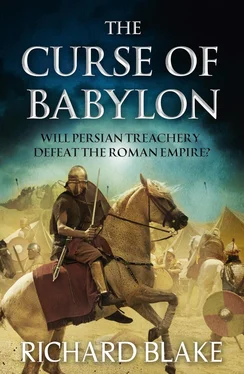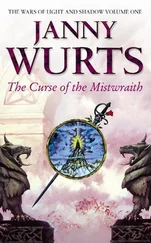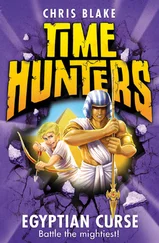Richard Blake - The Curse of Babylon
Здесь есть возможность читать онлайн «Richard Blake - The Curse of Babylon» весь текст электронной книги совершенно бесплатно (целиком полную версию без сокращений). В некоторых случаях можно слушать аудио, скачать через торрент в формате fb2 и присутствует краткое содержание. Жанр: Исторические приключения, на английском языке. Описание произведения, (предисловие) а так же отзывы посетителей доступны на портале библиотеки ЛибКат.
- Название:The Curse of Babylon
- Автор:
- Жанр:
- Год:неизвестен
- ISBN:нет данных
- Рейтинг книги:4 / 5. Голосов: 1
-
Избранное:Добавить в избранное
- Отзывы:
-
Ваша оценка:
- 80
- 1
- 2
- 3
- 4
- 5
The Curse of Babylon: краткое содержание, описание и аннотация
Предлагаем к чтению аннотацию, описание, краткое содержание или предисловие (зависит от того, что написал сам автор книги «The Curse of Babylon»). Если вы не нашли необходимую информацию о книге — напишите в комментариях, мы постараемся отыскать её.
The Curse of Babylon — читать онлайн бесплатно полную книгу (весь текст) целиком
Ниже представлен текст книги, разбитый по страницам. Система сохранения места последней прочитанной страницы, позволяет с удобством читать онлайн бесплатно книгу «The Curse of Babylon», без необходимости каждый раз заново искать на чём Вы остановились. Поставьте закладку, и сможете в любой момент перейти на страницу, на которой закончили чтение.
Интервал:
Закладка:
The old man who was standing tottered forward to the nearest of the candles. He stared at me for a long time through dull eyes. I met his look and hoped he wouldn’t begin chanting incantations, or try for a conjuring trick with the candles. That sort of thing could soak up time beyond reckoning — it certainly would if this old fool set fire to his sleeve. But he only wanted to see me properly. Though he was five feet away, I could smell the filthy clothes he wore as if we were in bed together. I was almost glad of the otherwise overpowering background smell.
‘Does My Lord know the story of how, in ancient time, King Cyrus took Babylon?’ he shrilled. I knew the account given in Herodotus. I’d heard a few doubtful supplements to this when I was in Ctesiphon. Obviously, it was time to hear it again. I remained silent. ‘When the city fell to the Persians,’ he said, dropping his voice to an aged whine, ‘the last King of Babylon was too busy digging in the foundations of his palace to lead a defence. After the last moment for victory had come and gone, he found what he had been told to seek. This was a sacrificial vessel made not by human hands. It was sent down from the skies by the ancient gods of his country. Anyone who kept it close would infallibly get his heart’s desire — but, in return, would be deprived of all human happiness.
‘The Horn was possessed by Cyrus. After its loss by his successors, it was possessed by the Alexander known as the Great. After him, it passed into the hands of those who desired other than worldly power. It is now sought again by those whose power is, or would be, of this world.’
‘And who might those be?’ I asked, perking up. The room fell silent. I was aware of a fly at the window. It could have flown straight out by going through a gap in the frame. Instead, it was beating itself against the oiled parchment. Now there was no other sound in the room, I could hear a child saying something in Armenian. It came from a few yards beyond the window, which must be into one of the courtyards. An adult was responding, though in a voice too low for me to hear what was said.
‘Can you explain why Heraclius is Emperor, and not Nicetas?’ the old man asked. I tried to make sense of his tone. Was this meant to lead me to enlightenment? Or was he after some from me? His Greek was too oddly accented for me to tell.
‘The story is well known and true in its essentials,’ I said, keeping my voice even. When the old man said nothing more, I gave way to the inevitable. ‘Thirteen years ago,’ I summarised, ‘the Emperor Maurice was deposed in a bloody coup — the first break in legal continuity for about three hundred years. He and his five sons were murdered, but it was at first hoped that Phocas the Tyrant would stabilise the frontiers. When he failed to do this, he kept power by launching a reign of terror that squashed all opposition.’ I thought of Priscus, who’d been the most enthusiastic officer of the Terror — in which capacity I’d first encountered him.
‘Eventually, his purges and inability to keep out of war with the Persians, and his inability to beat them in war, provoked, or enabled, the Exarch of Africa to start a second revolution. The Exarch put forward two alternative rival Emperors — his son, Heraclius, and his nephew, Nicetas. The deal was that whichever of them got first from Carthage to Constantinople and deposed Phocas would be Emperor. Nicetas came by land but got stuck in Egypt. Heraclius came by sea and had a smooth crossing. There’s more to the story, if you want to look at the details. But that is broadly what happened.’
The old man leaned forward. ‘So Heraclius is Emperor simply because he got here first?’
‘Yes,’ I said. Of course, there was more to it than that. Heraclius, if sickly, wasn’t an invalid. Heraclius wasn’t completely incapable of taking decisions. The old men were cackling away again in Syriac. One of them now switched into a different language, his voice rising to an ecstatic babble:
Ta-ak-bi-a-at pi-ka li-kal-li-ma i-na-ka
li-ip-ti-k .?u pa-da-nam pi-h ˘?? i-tam
h ˘ ?? arrana li-iš-ta-zi-ik a-na ki-ib-si-ka
šá-di-a li-iš-ta-zi-ik a-na šêpi-ka
He ended in a long fit of coughing. ‘Well spoken, my brother!’ one of the others called out, ‘The ancient words of the Horn are filled with wisdom — if only we could understand them.’ Once again, I thought of the time. I could stand here as some kind of supplicant, and get nowhere very fast, or I could take a chance.
‘I understand that Heraclius has been consulting you.’ I said. I looked at the suddenly shocked and silent faces and tried not to burst out laughing. Had these transparent frauds been the best our Great Augustus could find? ‘He wanted your help to win the Persian War,’ I improvised with more confidence. ‘You procured the Horn of Babylon and assured him it would bring him victory. It was then stolen before you could give it to him. You have brought me here because you need it back. You need it because, when he returns to Constantinople, he will not be pleased to learn that the object you have told him is of the utmost power is now in other hands — other deeply unfriendly hands.’
I smiled and moved my weight to my right leg. There was no doubt I’d cut out hours of dancing round the subject. Just before Christmas, Heraclius had burned two astrologers alive in the Circus, and had afterwards given a pious lecture to the mob on the Satanic nature of horoscopes. All that showed, of course, was that he believed in astrology. No surprise, then, he was now wasting the poor taxpayers’ money on some for himself. He was credulous without limit. The real wonder was that, after four years of military failure, he’d stopped at consulting the stars. Why hadn’t he also tried sacrifices to the Old Gods, or conversion to the fire worship of the Persians? Perhaps he had.
I went back to the question I’d been asked. ‘Where does Nicetas fit into this?’ I asked. I waited for an answer. Where did he fit in? Had his people stolen the Horn? I could assume there was some connection between him and Simon. I’d overheard Simon confessing that he’d missed getting the cup for himself. Who had got to it first? What had Nicetas wanted with it? Did he want its power for himself? He was another superstitious fool — though too besotted with his monks to risk his soul with magic. Perhaps he’d wanted to use the cup and other evidences of blasphemy to blackmail Heraclius into abdicating. Or perhaps he’d simply wanted to spare Heraclius from the sin of astrology. But Shahin — where did he fit in?
So many questions, though where to begin? One of the old men now found his voice again. ‘Has the young barbarian read the words?’ he asked the compounder. ‘Can he be aware that whoever reads the words engraved by unworldly hands upon the Horn of Babylon will start a process that cannot be stopped and will end in the collapse upon itself of the entire universe?’ The compounder let out a terrified yelp and rocked back and forth in terror. Evidently pleased, the old men went back to their own conversation.
This would never do. I clapped my hands together. When the room was silent, I walked over to the curtain. Looking as outraged as I was impatient, I turned back to face everyone. ‘Whether or not you claim the Emperor as your master,’ I cried in Syriac, ‘you are all traitors by your own confession. You are traitors and blasphemers. I think we all know the penalties.’ That got their minds off the end of the universe. Most Greeks never learn Syriac. These men had taken it as read a barbarian wouldn’t know it. Crap astrologers that showed them to be, I might add. I walked back to the middle of the room. ‘If you want me to walk out of here and never come back, I suggest you should put yourselves in order and start answering my questions.’
Читать дальшеИнтервал:
Закладка:
Похожие книги на «The Curse of Babylon»
Представляем Вашему вниманию похожие книги на «The Curse of Babylon» списком для выбора. Мы отобрали схожую по названию и смыслу литературу в надежде предоставить читателям больше вариантов отыскать новые, интересные, ещё непрочитанные произведения.
Обсуждение, отзывы о книге «The Curse of Babylon» и просто собственные мнения читателей. Оставьте ваши комментарии, напишите, что Вы думаете о произведении, его смысле или главных героях. Укажите что конкретно понравилось, а что нет, и почему Вы так считаете.












